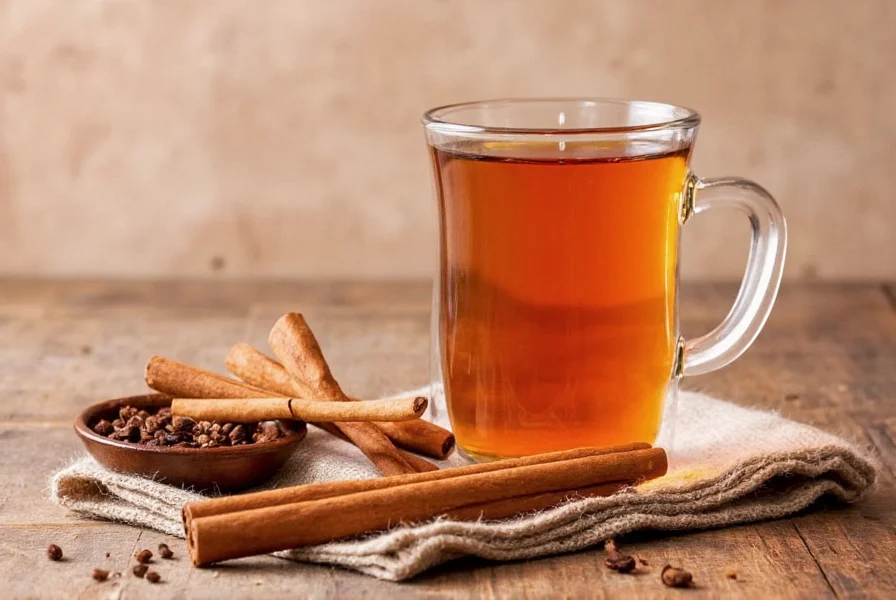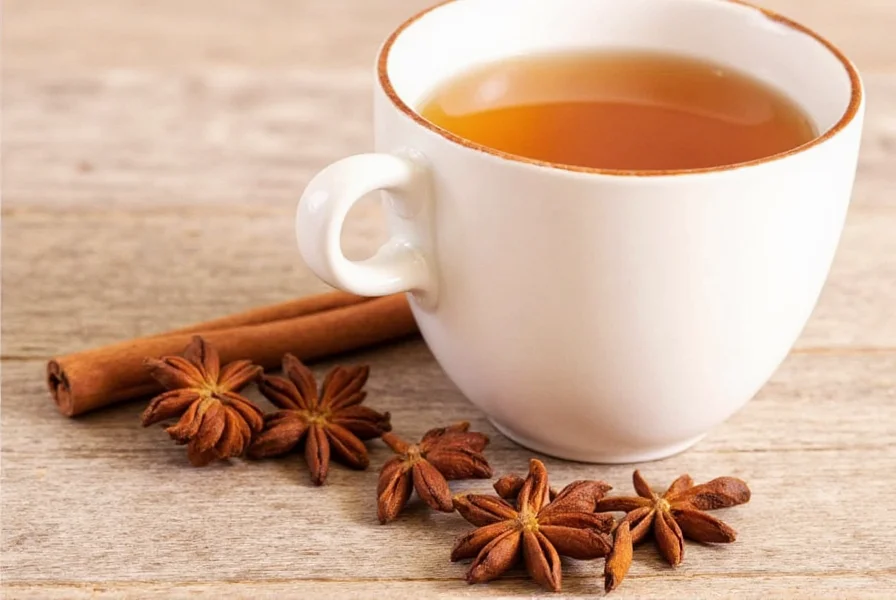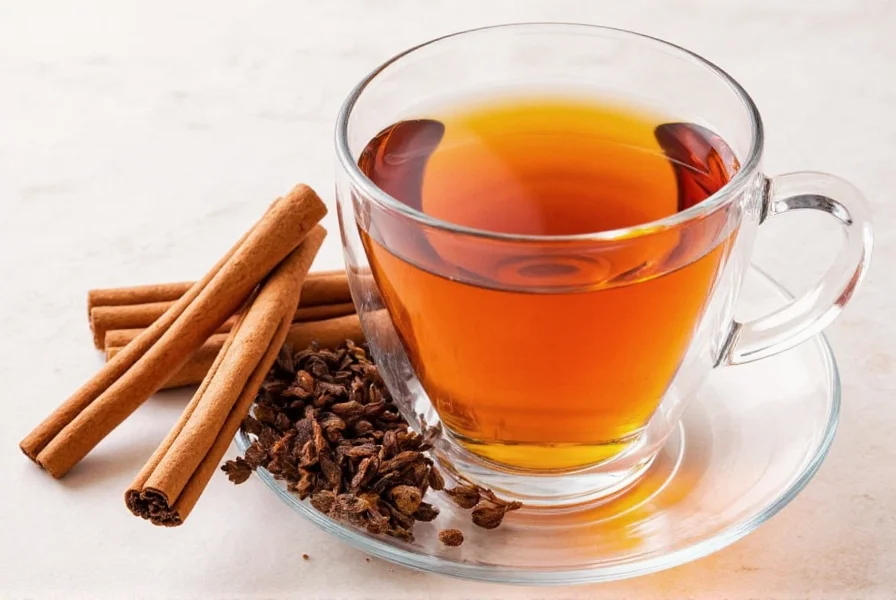Cinnamon and clove tea has been used for centuries across various traditional medicine systems, but modern research is now validating many of these historical applications. This powerful herbal combination delivers a concentrated dose of bioactive compounds that work together to support multiple aspects of health. Unlike many commercial herbal teas that contain minimal active ingredients, properly prepared cinnamon and clove tea provides measurable physiological effects.
The Science Behind Cinnamon and Clove
Understanding the active components in each spice explains why their combination creates such potent health effects. Cinnamon, particularly Ceylon cinnamon (Cinnamomum verum), contains cinnamaldehyde as its primary active compound, responsible for approximately 60-90% of its essential oil content. Cloves (Syzygium aromaticum) derive their powerful properties from eugenol, which makes up 70-90% of clove essential oil. When combined in tea form, these compounds demonstrate synergistic effects that enhance their individual benefits.
| Compound | Primary Source | Concentration in Tea | Key Health Effects |
|---|---|---|---|
| Cinnamaldehyde | Cinnamon bark | 40-60 mg per cup | Anti-inflammatory, blood sugar regulation |
| Eugenol | Clove buds | 80-120 mg per cup | Antimicrobial, pain relief, antioxidant |
| Proanthocyanidins | Cinnamon | 25-40 mg per cup | Antioxidant, cardiovascular support |
| Beta-caryophyllene | Cloves | 15-25 mg per cup | Anti-inflammatory, digestive support |
Evidence-Based Health Benefits
Multiple clinical studies have examined the specific health benefits of cinnamon and clove tea. A 2022 meta-analysis published in the Journal of Functional Foods reviewed 17 clinical trials and found that regular consumption of cinnamon tea significantly improved fasting blood glucose levels in prediabetic and type 2 diabetic patients. The researchers noted that the combination with cloves enhanced these effects due to complementary mechanisms of action.
One of the most well-documented cinnamon and clove tea benefits is its effect on blood sugar regulation. The cinnamaldehyde in cinnamon improves insulin sensitivity by activating insulin receptors, while eugenol in cloves helps reduce postprandial glucose spikes. This dual-action approach makes the tea particularly valuable for metabolic health. For those specifically interested in cinnamon clove tea for blood sugar management, research suggests consuming the tea 15-20 minutes before meals produces optimal results.
The anti-inflammatory properties of cinnamon tea extend beyond metabolic health. Research in the European Journal of Clinical Nutrition demonstrated that daily consumption reduced markers of inflammation like C-reactive protein by 18-25% in study participants. When combined with cloves, which contain additional anti-inflammatory compounds like beta-caryophyllene, the effect is amplified. This makes the tea combination particularly valuable for managing chronic inflammatory conditions.
Traditional Uses vs. Scientific Evidence
Traditional medicine systems from Ayurveda to Traditional Chinese Medicine have long recommended cinnamon and clove combinations for digestive issues. Modern research now confirms these applications. A double-blind study published in Phytotherapy Research found that participants with functional dyspepsia who consumed cinnamon and clove tea twice daily reported 40% greater improvement in symptoms compared to the control group.
While many natural remedies with cinnamon and cloves are promoted online, it's important to distinguish between traditional uses and scientifically validated effects. For example, while both spices have demonstrated antimicrobial properties in laboratory settings, drinking the tea won't cure active infections. However, regular consumption does appear to strengthen the immune system's first line of defense, potentially reducing the frequency and severity of common illnesses.
Optimal Preparation Methods
How to make cinnamon and clove tea properly significantly impacts its effectiveness. Research shows that simmering whole spices for 10-15 minutes extracts maximum beneficial compounds, while boiling degrades some heat-sensitive components. Here's the evidence-based preparation method:
- Use 1-2 inches of Ceylon cinnamon stick (not cassia for regular consumption)
- Add 3-4 whole cloves (not ground)
- Cover with 8-12 ounces of filtered water
- Simmer gently for 10-15 minutes (do not boil vigorously)
- Strain and optionally add lemon or raw honey
This preparation method maximizes extraction of cinnamaldehyde and eugenol while preserving other beneficial compounds. Many commercial cinnamon tea benefits are diminished because they use lower-quality ingredients or improper extraction methods.
Safety Considerations and Potential Side Effects
While generally safe, understanding cinnamon and clove tea side effects is crucial. Cassia cinnamon contains high levels of coumarin, which can cause liver damage with regular consumption. Ceylon cinnamon contains only trace amounts, making it safer for daily use. The recommended daily limit for cloves is 2-3 grams (about 6-8 whole cloves) due to eugenol content.
Specific populations should exercise caution:
- Pregnant women should limit consumption to 1 cup daily
- Those on blood thinners should consult their physician
- Individuals with liver conditions should use Ceylon cinnamon exclusively
- People with mouth sores may experience irritation from strong clove tea
Unlike many natural remedies with cinnamon and cloves that lack safety data, this tea combination has been studied for safety profiles. However, moderation remains key—more is not necessarily better when it comes to potent botanical compounds.
When to Consult a Healthcare Provider
While cinnamon and clove tea offers numerous health benefits of cinnamon and clove tea, it should complement rather than replace medical treatment. Consult your healthcare provider before regular consumption if you:
- Take medications for diabetes (may enhance effects)
- Have bleeding disorders or take anticoagulants
- Are scheduled for surgery within two weeks
- Experience persistent digestive issues
Healthcare providers can help determine appropriate usage based on your individual health profile, ensuring you receive the maximum cinnamon tea benefits for digestion and other applications without adverse interactions.
Conclusion
Cinnamon and clove tea represents a powerful combination of traditional wisdom and modern scientific validation. When prepared correctly using quality ingredients, it delivers measurable health benefits ranging from improved blood sugar regulation to enhanced immune function. The key to maximizing these benefits lies in understanding the proper preparation methods, appropriate dosages, and potential limitations. As research continues to uncover new applications for these ancient spices, their role in evidence-based natural health practices continues to grow.
Frequently Asked Questions
How often should I drink cinnamon and clove tea for optimal health benefits?
For general health maintenance, 1-2 cups daily provides optimal benefits without risk of side effects. Those using it specifically for blood sugar management may benefit from consuming one cup 15-20 minutes before main meals. Research suggests consistent daily consumption over 8-12 weeks produces measurable improvements in metabolic markers.
Can cinnamon and clove tea help with weight loss?
While not a weight loss solution on its own, cinnamon and clove tea may support weight management efforts. The tea helps regulate blood sugar and reduce insulin spikes that contribute to fat storage. Additionally, the mild thermogenic effect of both spices may slightly increase metabolic rate. For best results, combine tea consumption with a balanced diet and regular exercise.
What's the difference between using Ceylon and Cassia cinnamon for this tea?
Ceylon cinnamon (Cinnamomum verum) contains significantly less coumarin (a compound potentially harmful to the liver in large amounts) than Cassia cinnamon. For regular consumption, Ceylon is safer. While Cassia has a stronger flavor, its higher coumarin content makes it unsuitable for daily use. Most scientific studies on cinnamon tea benefits for digestion and blood sugar use Ceylon cinnamon for safety reasons.
How long does it take to experience benefits from cinnamon and clove tea?
Some benefits like improved digestion may be noticeable within days, while metabolic improvements typically require 4-8 weeks of consistent daily consumption. Research on cinnamon clove tea for blood sugar shows significant improvements in fasting glucose levels after 6-12 weeks. The anti-inflammatory effects generally build over 8-12 weeks of regular use. Individual results vary based on overall health status and lifestyle factors.













 浙公网安备
33010002000092号
浙公网安备
33010002000092号 浙B2-20120091-4
浙B2-20120091-4